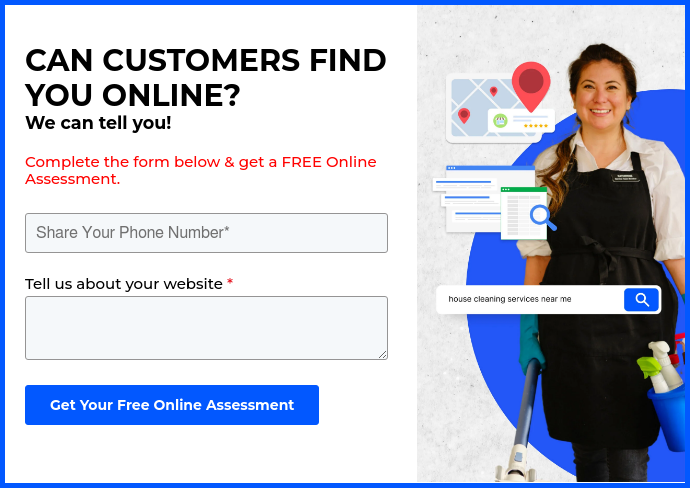10 Must-Have Small Business Technologies for Home Services Providers
Transform your home services business with these 10 must-have technologies. Improve efficiency, customer satisfaction, and profitability today!

Jump To...
Scheduling and Booking Software | Mobile Devices and Business Management Apps | Fleet Management Software | Inventory Management Software | Customer Relationship Management (CRM) Software | Online Payment Processing | Marketing Automation Tools | Estimating and Quoting Software | Home Automation and Smart Home Technology | Virtual and Augmented Reality (AR) Technology
A new study has shown that technology platforms play a huge role in the growth of small businesses. This couldn't be more true for those running a thriving home services business. Juggling various tasks like problem-solving and customer service can be demanding, but having the right small business technology in place can help everything run more smoothly.
From home automation systems to cloud storage solutions, there are plenty of must-have small business technologies for home services providers that can simplify the way your business operates.

1. Scheduling and Booking Software
An estimated 34% of clients schedule appointments online during non-business hours, which is why scheduling and booking software can make a noticeable difference for your home services business. It's one of those essential pieces of technology for a small business that you shouldn’t skip out on.
With scheduling and booking software, you can forget about the back-and-forth phone calls or emails to find a suitable appointment time. Your clients can easily book an appointment or service online, even when you're off the clock.
Source: GoSite
These software platforms often come with handy booking widgets that can be easily integrated into your website or social media profiles. This makes it even more convenient for potential clients to schedule an appointment with you, increasing the likelihood of securing new business.
Most popular scheduling and booking software options not only help you manage your appointments, but also offer extra features such as invoicing, payment processing, and customer relationship management.
2. Mobile Devices and Business Management Apps
As a small business owner, staying organized and connected is part of your success, and that’s where mobile apps come in handy. 66% of small business owners rely on mobile technology to run their operations, allowing them to manage their business on the go.
Imagine being able to access important documents, check your schedule, send invoices, and even process payments, all from your smartphone or tablet. That’s exactly the convenience that mobile devices and business management apps offer. There’s no need to get stuck doing back-office work after hours.
3. Fleet Management Software
If you manage a home services business with a team of contractors, it's your responsibility to ensure that their time is used efficiently and they're reaching their clients on schedule. Fleet management software works to make overseeing the process a lot easier. The market size is projected to grow from 18.2 billion USD in 2021 to 67.38 billion USD in 2029.
Fleet management software is a fantastic technology for small business owners that need to manage a team of service vehicles. It helps you track your vehicles' locations, optimize routes, and monitor driver behavior, ultimately leading to better fuel efficiency and improved customer service. It also takes the guesswork out of managing your team on the road, which can be a huge relief.
These platforms offer features like real-time GPS tracking, route optimization, and even maintenance reminders to keep your fleet in top shape.
4. Inventory Management Software
Whether you’re in the painting business or plumbing business, keeping track of your stock levels, supplies, and equipment is a common thread among home services businesses. 43% of small businesses don’t track their inventory at all, which means they’re missing out on the benefits of this type of software.
Inventory management software allows you to monitor your stock levels in real time, helping you avoid running out of essential items or overstocking on things you don't need. This not only saves you time but also helps you reduce costs and improve your bottom line.
Many of these software solutions also offer features like barcode scanning and automated reordering, making the entire inventory management process even more seamless. Having a clear overview of your inventory can help you make informed decisions for your business, such as identifying popular items or services and planning your future investments.
5. Customer Relationship Management (CRM) Software
CRM tools allow you to manage and organize all your client information in one place, so you can build strong and lasting relationships with your clients.
Source: GoSite
The ideal system should have all your contacts – from leads to loyal customers – easily accessible and neatly organized. As well, it should let you keep track of important details like client preferences, appointment history, and even send out personalized marketing campaigns.
As CRMs become more and more popular, software continues to upgrade. 79% of companies expect to use AI-powered automation in CRM systems in 2023.
6. Online Payment Processing
Clients should always have a hassle-free experience when it comes to making payments. With online payment processing platforms, you can accept a wide range of payment methods, such as credit cards, debit cards, and even digital wallets like PayPal or Google Pay. This flexibility not only provides convenience to your clients but also helps you get paid faster.
Source: GoSite
The ideal payment platform offers secure, easy-to-use solutions that can be integrated with your website or invoicing system. There are also various features that are nice to have, including invoice creation and being able to text or email direct payment links to customers.
7. Marketing Automation Tools
Marketing automation tools help take care of repetitive tasks such as sending emails, posting on social media, and collecting customer data, giving business owners more time back. Nucleus found that companies using marketing automation see a 14.5% increase in sales productivity and a 12.2% reduction in marketing overhead. The problem is less than half of companies are using marketing automation solutions.
Source: GoSite
One standout feature of marketing automation tools is their ability to simplify the process of requesting reviews from customers. By automatically sending out emails to customers after a purchase or interaction, businesses can effectively gather valuable feedback without much effort. These emails often include direct links to popular reviewing platforms like Google, making it convenient for customers to share their thoughts and experiences.
8. Estimating and Quoting Software
Estimating and quoting software simplifies the process of creating and sending accurate estimates to potential clients. One of the main benefits of using estimating software is the ability to incorporate customer changes seamlessly, keeping all parties informed and satisfied throughout the negotiation process.
Source: GoSite
Software in this niche enable businesses to save time and reduce the risk of errors in their quotes, leading to improved customer satisfaction rates and a higher likelihood of securing contracts. User-friendly design makes it easy for even the most inexperienced users to navigate and produce professional-looking estimates quickly.
9. Home Automation and Smart Home Technology
Embracing home automation and smart home technology can truly provide a competitive edge for local providers and set them apart. By incorporating these advanced systems, businesses can offer a seamless, personalized, and efficient experience that meets the demands of modern customers. As a result, customer satisfaction and loyalty are likely to soar, which can lead to increased revenue and a stronger market presence.
So for home services providers who offer in-home repairs, renovations, etc., smart technology installs can increase sales and customer loyalty.
For small brick-and-mortar businesses, adopting home automation and smart home technology can lead to significant benefits. Especially as one of the biggest expenses for many businesses is energy costs, investing in smart thermostats, automated lighting, and energy-efficient appliances can help businesses reduce their carbon footprint while also cutting down on operational costs. Additionally, smart security systems can provide peace of mind, protecting valuable assets and ensuring a safe environment for both employees and customers.
10. Virtual and Augmented Reality (AR) Technology
In simple terms, virtual reality (VR) immerses users in a completely digital environment, while augmented reality places digital elements onto the real world. Both VR and AR have become increasingly popular in many areas, from gaming and entertainment to education and training. And with the introduction of new devices, more industries are expected to adopt the use of VR.
Deloitte talks about how businesses can use virtual or augmented reality as part of their business strategy and “reimagine how work gets done.” These tools can significantly enhance various aspects of operations. From communication and collaboration to training and simulation, customer experience, and interactive marketing, VR and AR can change the way small businesses function and interact with their customers.
For example, businesses can use AR to provide customers with visual guidance for troubleshooting product issues. Or, provide employees with immersive, hands-on experiences to learn new skills and procedures in a more engaging manner.
Particularly for remote workers or businesses with contractors across the country, VR and AR technology for small businesses can facilitate communication and collaboration among team members, regardless of their location. Virtual meeting rooms can be created, letting employees work together in real time, share ideas, and tackle projects together.
Onboard the Right Small Business Technology to Maximize Your Profits
So, you've made it this far in your small business journey, and now you're ready to take things up a notch. Adopting new technology is what will help your profits grow. With the right tech in your corner, you'll be well on your way to streamlining processes, enhancing customer experiences, and making daily tasks a lot easier.
The key is to choose the right tools and solutions that work for your business needs. Don't just jump on the latest trends; instead, look at what makes the most sense. Because when you've got the perfect blend of small business technology, your business is more likely to thrive.
%20(1)%20(1).png?width=340&name=Group%2012%20(2)%20(1)%20(1).png)



